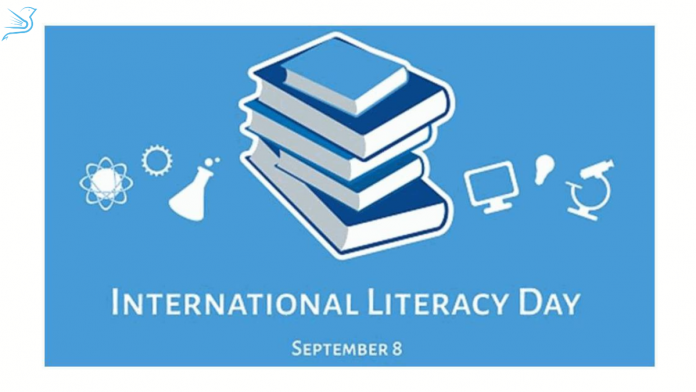Hello candidates, today we are going to talk about International Literacy Day 2021. We will be discussing its importance, history, and many more interesting topics. Also, what will the theme of International Literacy Day 2021 be?
On September 8, 2021, we will celebrate International Literacy Day in the United States. These days are intended to increase awareness of the significance of reading, as well as to address any problems that may arise in the future. For a healthy and happy society, literacy is a must. It is possible to stay on top of the latest trends by being able to read and write.
International Literacy Day: History
International Literacy Day was established by UNESCO in 1966. People across the world were reminded that literacy is important for people, communities, and civilizations by observing World Literacy Day. Day of Literacy also emphasizes a concerted effort to increase literacy in society and raise awareness of the importance of literacy.
In the UN’s Sustainable Development Goals and the 2030 Agenda for Sustainable Development, literacy is a significant problem.
The official website of UNEP states: “The Sustainable Development Agenda of the United Nations (UNSDAP), approved by global leaders in September of 2015, encourages universal access to excellent education and learning opportunities for all individuals.” SDG 4 aims to improve reading and numeracy abilities for everyone, including those who lack these skills.’
Importance of International Literacy Day
For both individuals and society, being read and educated is essential to success in life. To understand things and have productive conversations, you need to start with fundamental reading. In the 21st century, illiteracy is still a major problem. 775 million people are estimated to be illiterate; one in five adults is still illiterate, and two-thirds of them are women; 60.7 million children are out of school, and many more attend school sporadically or drop out altogether.
Global Monitoring Report on Education for All by UNESCO (2006). Sub-Saharan Africa and South Asia have the lowest regional adult literacy rates (58.6 percent) (59.7 percent ). Burkina Faso (12.8%), Niger (14.4%), and Mali (14.4%) have the lowest literacy rates in the world (19 percent ). A significant link exists between illiteracy and poverty, as well as between illiteracy and discrimination towards women.
While the countries excel in technology, science, and the arts, they have a long way to go. Basic literacy skills are still lacking in several parts of the world. As a result, raising awareness and taking actions to reduce the low literacy rate are urgently needed.
- Brain health
Studies indicate that reading, writing, and working with numbers regularly maintain brain cells healthy as we age, lowering the risk of Alzheimer’s and dementia later in life.
- Community participation
Adults and children alike are prevented from participating fully and contributing to the improvement of society due to the absence of literary abilities.
- Effective Communication
To communicate effectively with others, we must be able to read and write, which enhances vocal language skills, helping us to convey our feelings, thoughts & ideas more clearly.
- Employment Advancement
As a social-economic climber, the ability to read, write, and deal with figures is essential. Every time a person is educated, they are breaking the cycle of poverty.
- Knowledge is Power
Literacy is the key to personal empowerment and gives us personal dignity and self-worth.
Traditions of the Day
We frequently take for granted the ability to read and write. As a society, we rely heavily on reading. Navigating the world without the ability to read or write is difficult because it prevents you from experiencing so much.
This is an opportunity for organizations and people to use their literacy skills positively by encouraging and assisting others who are struggling with reading, writing, and other literacy skills. A student’s tuition and learning are supported so that they can achieve long-term success.
They also hold think tanks to develop the best policies for eradicating illiteracy at the grassroots level, as well as host think tanks, conferences, and discussion forums to design and execute the best policies. For this purpose, they also organize fundraisers. Every year, a topic is chosen for International Literacy Day as a method to raise awareness about a particular issue.
International Literacy Day 2021 Theme
A human-centered recovery is the theme of UNESCO’s International Literacy Day 2021, which will focus on closing the digital gap via literacy.
The Coronavirus epidemic has shaken the world in the past two years, and it’s just going to get worse. There has been a significant influence on the economy, development, and even the learning of children as a result of this. As a result of the Pandemic, inequalities were expanded, and the 773 million illiterate youth and adults were disproportionately affected.
Work and education have been secured through distance learning in the wake of lockdown and the new normal. Home-based work and online education have become a need for many people. When the pandemic hit, it revealed the digital gap in terms of access, infrastructure, and capacity to engage with technology. On the other hand, it brought to light the differences in fundamental amenities such as access to power and how that affects the availability of educational opportunities.
In many ways, Pandemic reflected the world’s literacy requirements. For UNESCO, this year’s theme is to close the digital divide and open the door to literacy. But the outbreak served as a stark reminder of the significance of reading. Additionally, literacy empowers individuals and improves their lives by giving them more options for living a life they can be proud of.
And it promotes sustainable growth as well. Education and lifelong learning based on humanism, as described by Sustainable Development Goal 4, include literacy as an essential component. The rehabilitation from the COVID-19 problem must be based on the human being.”
What Initiatives can be taken on this Day?
- Donate books to local classrooms
There is always a need for new reading material in elementary school classroom libraries to keep kids engaged in reading. Obtain a wish list from your child’s teacher and give books to the class. Consider asking coworkers, family, or neighbours if they would be interested in contributing books to their children’s classroom libraries if you don’t have a kid in school yourself The day after International Literacy Day, you’ll be their hero.
- Gift a book
Curiousness is inborn in children. As well as satisfying their thirst for knowledge, reading stimulates their imagination. Whether it’s for a birthday or a holiday, or just to say “I was thinking about you,” books are always appreciated. Don’t you believe that International Literacy Day is the perfect opportunity to express “I was thinking about you” by giving a book to every child you know? Book presents are appreciated by both children and adults.
- Start a community lending library
Organize a group of relatives, friends, or neighbours and create a small lending library in your community today. When Todd Bol, a resident of Hudson, Wisconsin, opened the first “Free Little Library” in 2009, he wanted to make book sharing easy and available to everyone in his community at any time. To him, taking a book and returning a book is a matter of honour. Because these libraries are open 24 hours a day, 7 days a week, there are no late fees or fines.
A reminder that illiterate people exist in wealthy nations as well as third-world ones, International Literacy Day is a good reminder. To celebrate International Literacy Day, we should appreciate our parents, grandparents, siblings, and instructors who took the effort to teach us to read and write when we were children. They look to be almost impossible to solve. One problem that may be overcome is breaking the cycle of illiteracy – one child at a time and one adult at a time.
For much more interesting knowledgeable Blogs, visit https://hranker.com/blog




